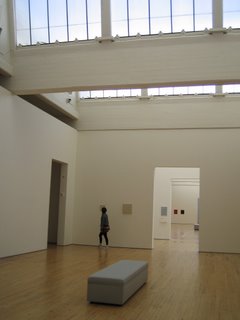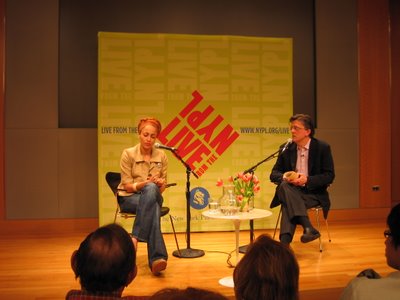a "Beacon" of good living, and Z(S)adie Smith
Had another weekend full of art and culture, and felt revived by it. I find the city incredibly intense and disorienting at times, and relish weekends if for nothing but the leisurely pace, and a little bit of sun on my skin.
 So, my roommates and I decided to bring a picnic and go to the Dia: Beacon museum on Saturday morning -- 250,000 square feet of [mostly] American art, in a renovated warehouse north of the city that used to be devoted to printing boxes for Nabisco cookies. Because the museum is adjacent to the Beacon MetroNorth station, it was easily accesible to little city mice like us.
So, my roommates and I decided to bring a picnic and go to the Dia: Beacon museum on Saturday morning -- 250,000 square feet of [mostly] American art, in a renovated warehouse north of the city that used to be devoted to printing boxes for Nabisco cookies. Because the museum is adjacent to the Beacon MetroNorth station, it was easily accesible to little city mice like us.
In a New York Times article devoted to the space, Dia Art Foundation Trustee and Barnes and Noble chairman, Leonard Riggio is quoted as saying:
"...This is a place that makes humans feel better for being there.''
Of course, there are no cameras allowed in the galleries, but I snapped a few quick photos with my little spycam (pictured here are works by John Chamberlain and Richard Serra.



* * *
This weekend I was also lucky enough to see Zadie Smith in "conversation" with Kurt Andersen, fantastic writers both -- she of fiction, and he of non-fiction. Despite her deep, almost masculine Willesden accent and constant fidgeting and scratching, we were a captive audience, and I felt very akin to her writerly "self-disgust" [as she called it] and doubt.

She was really open about everything:
* her real name ("Sadie...I changed it because I was in love with a boy whose name started with 'Z' so I thought I'd show him solidarity by joining him at the other end of the alphabet");
* choices for her characters (Kiki in *On Beauty* is a heavy woman because Smith could relate to those who had undergone a massive physical change -- she from chubby to slim, and vice-versa for her character);
* how she felt about people saying that the only reason her book was published was that she sent her photo along with it ("really angry"),
* being called a "postcolonial author" or an author that addressed "multiculturalism" ("I just write my reality, and that reality just happens to be multicultural...but I have no wisdom about these things");
* and what it's like to follow up a debut novel like *White Teeth* ("I'm thirty and grew up in a generation enormously suspicious of very popular things, and so when 5 million people bought my book, you can imagine how I felt about it").
People love to hate her, but I think I just love her.
 So, my roommates and I decided to bring a picnic and go to the Dia: Beacon museum on Saturday morning -- 250,000 square feet of [mostly] American art, in a renovated warehouse north of the city that used to be devoted to printing boxes for Nabisco cookies. Because the museum is adjacent to the Beacon MetroNorth station, it was easily accesible to little city mice like us.
So, my roommates and I decided to bring a picnic and go to the Dia: Beacon museum on Saturday morning -- 250,000 square feet of [mostly] American art, in a renovated warehouse north of the city that used to be devoted to printing boxes for Nabisco cookies. Because the museum is adjacent to the Beacon MetroNorth station, it was easily accesible to little city mice like us.In a New York Times article devoted to the space, Dia Art Foundation Trustee and Barnes and Noble chairman, Leonard Riggio is quoted as saying:
"...This is a place that makes humans feel better for being there.''
Of course, there are no cameras allowed in the galleries, but I snapped a few quick photos with my little spycam (pictured here are works by John Chamberlain and Richard Serra.



* * *
This weekend I was also lucky enough to see Zadie Smith in "conversation" with Kurt Andersen, fantastic writers both -- she of fiction, and he of non-fiction. Despite her deep, almost masculine Willesden accent and constant fidgeting and scratching, we were a captive audience, and I felt very akin to her writerly "self-disgust" [as she called it] and doubt.

She was really open about everything:
* her real name ("Sadie...I changed it because I was in love with a boy whose name started with 'Z' so I thought I'd show him solidarity by joining him at the other end of the alphabet");
* choices for her characters (Kiki in *On Beauty* is a heavy woman because Smith could relate to those who had undergone a massive physical change -- she from chubby to slim, and vice-versa for her character);
* how she felt about people saying that the only reason her book was published was that she sent her photo along with it ("really angry"),
* being called a "postcolonial author" or an author that addressed "multiculturalism" ("I just write my reality, and that reality just happens to be multicultural...but I have no wisdom about these things");
* and what it's like to follow up a debut novel like *White Teeth* ("I'm thirty and grew up in a generation enormously suspicious of very popular things, and so when 5 million people bought my book, you can imagine how I felt about it").
People love to hate her, but I think I just love her.


0 Comments:
Post a Comment
<< Home